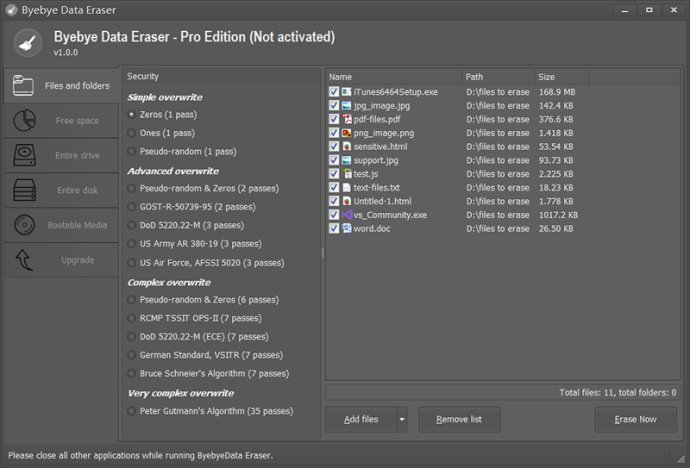Pro for Business Edition offers all the same disk erasing capabilities as Pro for Home Edition, with the added benefit of being designed for commercial use. It can erase disks, drives, free space, files, and folders, and create bootable media for wiping entire OS-containing disks.

The graphical interface is user-friendly and easy to navigate, making it simple to use. It supports a total of fourteen erasing standards and allows commercial use on one computer. Additionally, it also offers a create bootable media function that is available. The software supports FAT / exFAT / NTFS, Apple's HFS+, Linux Ext2 / Ext3 / Ext4, and Unix UFS file systems.
Moreover, the software has support for various Input / Output interfaces such as IDE, USB, SATA, eSATA, SSD, SCSI disks, LUN, RAID Disk Array. It securely overwrites and destroys data on disks, drives, free space, and individual files and folders. It supports all kinds of file systems on Windows, Mac, and Linux, or Unix.
One of the best things about this software is that although it mainly works on Windows systems, it is still capable of erasing other file systems from different OS. All you need to do is connect their hard drive to Windows, and you're good to go. Overall, ByebyeData Eraser Pro for Business Edition is an excellent software for commercial use, offering high-quality features at an affordable price.
Version 1.13.0:
1. Fixed an incorrect link of the installation package.
2. Fixed default prompt error of executing window.
3. Improved the registration window.
Version 1.10.0:
Graphical interface, easy to use.
Supports fourteen erasing standards.
Pro-Allow commercial use on one computer.
Pro-Create bootable media function available.
Supports FAT/exFAT/NTFS, Apple's HFS+,
Linux Ext2/Ext3/Ext4 and Unix UFS file systems.
Supports various Input/Output interfaces.
Version 1.0.0:
Graphical interface, easy to use.
Supports fourteen erasing standards.
Pro-Allow commercial use on one computer.
Pro-Create bootable media function available.
Supports FAT/exFAT/NTFS, Apple's HFS+,
Linux Ext2/Ext3/Ext4 and Unix UFS file systems.
Supports various Input/Output interfaces.